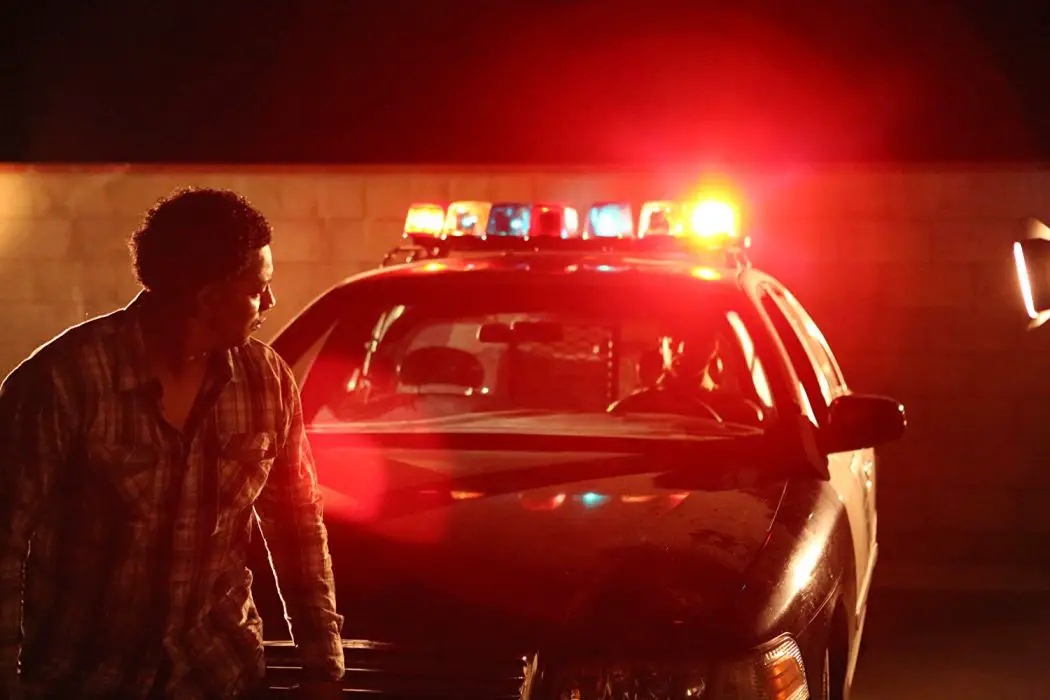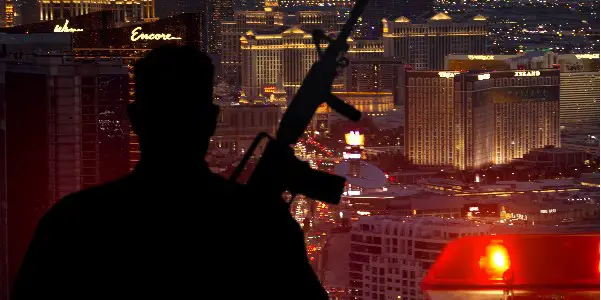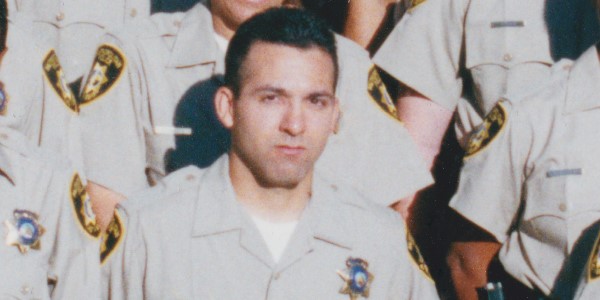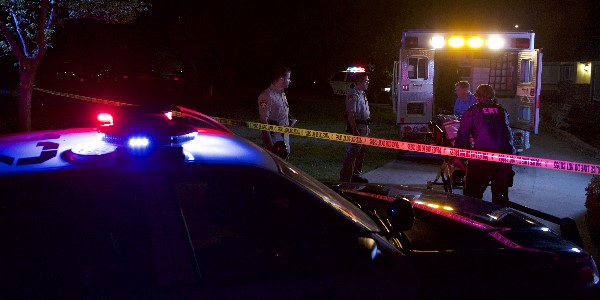“The Leadership Is As Corrupt As They Come”: An Interview With WHAT HAPPENED IN VEGAS Director Ramsey Denison

Musanna Ahmed is a freelance film critic writing for Film…
On a day in August in 2013, Ramsey Denison and a friend had travelled to Las Vegas for vacation, coming from Los Angeles where Denison works as a TV editor. One way he didn’t expect his vacation to go was being beaten up – the footprint is visible in his mug shot – and arrested by the police. The reason? He witnessed police brutality in the parking lot and decided to call the cops to report the abuse of power in front of him.
Ramsey Denison is someone who’s spent a lot of time in his career editing shows about good cops who catch bad criminals, so suffice to say this outrageous experience was a shock to him and would be to anyone else. To follow up looking into the “who”and the “why” of the criminally unacceptable circumstances in which he was beaten up and arrested, he decided to dig deeper into the Las Vegas Metropolitan Police Department by making a documentary.
The result is What Happened in Vegas, a powerful film that uses the experience of four victims who died at the hands of the LVMPD – Trevon Cole, Tashii Farmer, Stanley Gibson and Erik Scott – as well as Denison’s own personal experience to detail a history of corruption within the department.
We hear the stories of Denison himself, ex-officers, attorneys, family members of the victims, and the multitude of perspectives helps paint the ugly picture of a police force with individuals who, as Denison tells me, not only should they not be in charge but “they shouldn’t even be in law enforcement.” What Happened in Vegas had its premiere back in March, before the Stephen Paddock opened fire into a huge crowd at a music festival on the Las Vegas Strip, resulting in 58 deaths and 546 injuries.
It was an important document to begin with but after the deadliest mass shooting in US history happened, it’s more essential and timely than ever. I had the opportunity to talk to Ramsey Denison about a range of things including what he learned during the making of What Happened in Vegas, the public image of Vegas and the LVMPD, how the film has been received so far, the editing process, and what he feels needs to be done in the LVMPD in order to change things for the better.
Musanna Ahmed for Film Inquiry: There’s a scene in the film where you’re telling your story to LVMPD captain Larry Burns and you say “I never really thought bad cops were out there until I saw it with my own eyes”, so I’m curious to know when you set out to make this film, to what extent was this exploration a learning process for you?
Ramsey Denison: When I originally made the film, I really hadn’t thought much about police corruption and police brutality so it kind of turned me onto the fact that this is a real problem in Vegas. I mean, if you can beat up, harass and throw a citizen a jail just because they reported police brutality and then completely get away with it, then what else has the LVMPD done? So it started off as a curiosity, “Is this police department really as corrupt as I think they might be?” and what I found is that they were more corrupt than I could have ever dreamed of.
They have a history of making videos disappear, of not holding officers accountable, and the big revelation with the film though, what I discovered over time meeting good cops like Larry Burns was that the problem isn’t that most LVMPD cops are bad because they’re not – most LVMPD cops are good. The problem isn’t that most cops are bad, it’s that the ones who are get away with it because the leadership in the LVMPD is as corrupt as they come.
So that was really what I came to realise over time making the film, that it’s really the people in charge of the department. I mean the second in command of the department right now is a guy named Kevin McMahill and earlier in his career he was part of a squad that found a woman with drugs on her and allegedly told her they’d let her off if she showed them her genitals.
This guy cost taxpayers money, that case went to court, and he left the LVMPD but then he came back and now he’s risen up to number two in the department. You just ask yourself, “What kind of a department would put a scumbag like that in charge?” – the LVMPD! So when you have somebody like that as number two in the department… frankly their whole executive branch is pretty much corrupt and has a history of corruptions so that’s the real problem.
I’m not a cop hater and I don’t believe most LVMPD cops are bad but there are bad ones and the dirtbags in charge of the LVMPD don’t hold them accountable because they’re as bad as those cops, if that makes sense.
Absolutely. By extension of what you just said – you tell this story through a variety of perspectives (friends, ex-officers, attorneys, etc) in your documentary, so do you know if police corruption is a widely known issue amongst the general community of Las Vegas or is it something you think the Vegas public will begin to learn about from seeing your documentary?
Ramsey Denison: That’s a good question, I think that a lot of people in Las Vegas know that their police department is wildly corrupt, particularly people in the African-American community. As we talk about in the movie, there was once a guy who was once booked as Bill with the n word as his middle name. They booked him like that in court. That was many years ago but the LVMPD really has a history of really treating African-Americans, in particular, horribly and has killed a lot of African-Americans unjustifiably, as we explore in the film, so I think by and large in Vegas this a widely known that this is an out-of-control corrupt department that doesn’t hold officers accountable but I think outside of Las Vegas very few people know that.

One of the reasons for that is the show Cops is filmed in Las Vegas. An interesting thing to know about a show like Cops is that they’re in control, the LVMPD is in control, they get to present themselves how they want to present themselves and if something puts them in a negative light it just ends up on the cutting room floor. I can tell you that from first-hand experience because I’ve worked on a lot of true crime shows and the companies that work with someone like the LVMPD, they have to make sure that they don’t alienate them or put them in a negative light so then when they want to film another episode, the police department won’t let them.
The police department has a lot of power, and they have a lot of power over how they’re portrayed in Vegas, and of course if something makes them look bad, it’s not gonna end up in the show, so the public will be shocked to learn just how wildly out-of-control and corrupt the LVMPD is, which the documentary makes very clear.
Absolutely. Another question in relation to the variety of perspectives – was there anyone who you wanted to talk to but couldn’t access?
Ramsey Denison: Yeah, I mean, I had the cooperation of three of the four victims’ families explored in the movie. I was never able to get in touch with Trevon Cole’s family but we tried. Tashii Farmer’s family was great, they’ve become good friends of mine, Eric Scott’s family was great, they’ve become good friends of mine and Rhonda Gibson, Stanley’s widow, has also become a good friend of mine so I got access to three out of four of them and the interesting thing is they’ve already become friends, like true friends.
People that I talk to, at least once a week or at least once every two weeks and text regularly, and making the movie really introduced me to how real the pain is for these people and how they’ll never really get over it. A week ago I got notified that Trinita Farmer, Tashii’s mom, had gone to the hospital just with a panic attack. It really leaves a lasting mark on them and that was really the thing I came to realise by getting to know the victims so well. Even after years and even if they get financial settlements it really doesn’t do much to erase the pain, and by coming to know them so well that was something that I learned.
It was very powerful listening to the experiences of the families and other loved ones who were affected. You mentioned before how with shows like Cops the LVMPD control their on-screen representation, so was it intentional to not focus on their side but to focus on the perspective of the victims alone?
Ramsey Denison: Yeah and that was frankly because it is my belief that they are so corrupt and so dirty that if they knew we were making the film, they would attempt to stop it. All of a sudden there’d be flashing red lights in your rear-view mirror and “Oh, what’s that?” and maybe there’s a bag of cocaine planted on you and you go away for five years. That may sound outlandish or a bit much but what I came to realise making this film about the LVMPD is that that’s not outlandish, they are a very vindictive organisation and there’s other people who have crossed the LVMPD and paid the price for it.
There’s a journalist named Laurence Mower who wrote a really excellent series of articles about the LVMPD in 2012 and I don’t think it’s a coincidence that he immediately left town after those articles came out. The movie was very successful in festivals in Las Vegas and won awards at Freedom Fest, Las Vegas Black Film Festival, so the festivals were receptive to the movie but the movie theaters were not. They were scared of the film.
We had three occasions where we had somebody who saw the film, thought it was very powerful and wanted to book it and then all of a sudden those bookings just went away and we couldn’t get anybody on the phone. It’s my belief that they were scared of the LVMPD. So yeah, I definitely tried to stay under the radar whilst making the movie and I didn’t want them to know about it until it was done.
Are you aware of any reactions from them yet?
Ramsey Denison: They haven’t said a word about it but it’s my belief that they’re very aware of the film and they’re trying to ignore it. It was interesting when we screened it at Freedom Fest in July, where we won the Grand Jury Prize, we had a packed screening but there was two LVMPD officers parked outside the door when the screening was going on, about 150 or 200 feet away. Just sitting there trying to make their presence known, right there at the Paris Resort and Casino where we screened. I think they’re aware of the film but don’t want to acknowledge it and that they’re just hoping it’ll go away. It’s not going to.
Because of your background as an editor, I’d like to know your approach to this film. You cover several cases from over a period of years, so what was the editing process like in regard to everything you wanted to cover?
Ramsey Denison: I started making the film shortly after this happened to me which was in August 2013 and I was working the whole time I was shooting this movie. I live in Los Angeles so I would work 50 hours a week on television shows and on Friday night I would drive into Vegas and film all day Saturday and all day Sunday then drive back to Los Angeles on Sunday night. I did that for about a year and a half, just racking up footage, not editing it but just ingesting it and organizing it.

That was really grueling so once I had that year and a half’s worth of footage from shooting on the weekends, I took some time off work for about six months to start editing it and that’s when the bulk of the editing was done. The film was pretty much done early this year, it had screened at a bunch of festivals and we got distribution but then the Vegas mass shooting happened. I had made a lot of good friends who were officers that recognized how corrupt the LVMPD was and they reached out to me to tell me “Hey, there’s a lot of things going on with the mass shooting that they’re lying about” like trying to hide the fact that there was an ‘accidental’ gunshot in the room.
What they were trying to tell me was that the LVMPD was trying to manipulate this event so because of that I decided we had to go and find out what was really going on with the Vegas mass shooting because it sounded like the same old thing – here they are again, trying to manipulate events as they’ve done previously. We went back to Vegas a couple of weeks ago and filmed some material about their cover-up of the accidental gunshot and the other things you see in the movie. I edited that real fast and the latest cut was just completed like two days ago, the movie just got finished, so I hope that answers your question.
It’s quite interesting because you clearly show the extent to how corrupt they’ve been over the years but people are just learning now because of the aftermath of the Stephen Paddock shooting so it makes you wonder, when do you end a film like this? Because next month, or next year, the story could keep unfolding.
Ramsey Denison: That’s right. Believe me, I wanted the film to be over after we screened it at Freedom Fest in July because you definitely want to move on from one film onto the next one but the problem is when the mass shooting happened, I felt that they were trying to manipulate the situation. Frankly, some of the things they were doing didn’t even make it into the film because we didn’t even have time.
I wanted the world to know that just because the LVMPD tell you something happened, it doesn’t necessarily mean that it happened. I mean, they waited for a month to reveal that there was a gunshot in Stephen Paddock’s room. They tried to hide that and the only reason that they ended up revealing it, as we show in the movie, is because a journalist who’s a former cop called them out on it. Joe Lombardo didn’t say anything for weeks but this former cop actually reached out to the local media and started telling them about it. Almost a month later, Lombardo admits that there was a gunshot but it’s obvious he tried to hide it as well as other things. Given the LVMPD’s history of making videos disappear, I think it’s terrifying.
The victims of the mass shootings deserve justice, they deserve to know what really happened. The LVMPD are in pocket with MGM and if they can do something to minimize MGM’s legal liability, they will do it, MGM is very tight with Lombardo and have given him financial support. I want the victims of the mass shooting to know “Hey, there’s more going on here than you might think and don’t trust these guys to play it straight, cos they have a history of not doing that.” MGM needs to be held accountable for attempting to ensure they only have hundreds of millions to victims rather than billions. Over 500 people were affected by the shooting and I do think the MGM will try to minimize the amount of money they’ll pay out.
Given the currency of the situation, do you intend to continue your exploration of the LVMPD? Perhaps through a second documentary?
No (laughs). Quite honestly it was a very heavy project and a movie like this takes a toll. You don’t wanna spend your life doing this, just exposing police corruption, because it could end up being a short life (laughs).
That’s very understandable. Police corruption is a theme that I’ve seen in other documentaries too this year such as Whose Streets? and The Force which take place in other cities, Ferguson and Oakland, is this something you’ve noticed and do you think there’s a link between here and there?
Ramsey Denison: It’s my belief that police corruption and police brutality has been going on for decades but the wide availability of camera phones – I think the guy who invented the camera phone is the greatest police accountability activist ever. Because now people can just whip out their phones and videotape something and you see undeniable evidence of it.

What went on for decades is people would tend to believe the police, so they could just lie in certain situations and since there was no footage of it, people would believe them and then there’d be no justice but what happens now like what you saw with the Eric Garner case and what you see with Ferguson is that people are flipping out their phones and unlike police officers, cameras don’t lie. When you see undeniable evidence of something, it’s pretty clear that there’s a problem.
Yeah, like the whole footage in Whose Streets? is citizen footage, all recorded on smartphones. I want to talk about the cinematography in your film. There’s a lot of splendid shots, especially from the aerial angles, of the city and its famous landmarks and it contrasts with the dark story you’re telling. It’s a powerful and effective juxtaposition, so could you tell me more about this storytelling decision, was it intentional?
Ramsey Denison: Oh yes. I love drones. Drones are amazing and I think it’s humbling for a lot of cinematographers to realise that this little foot-long robot can get better shots than the world’s greatest cinematographer like Vittorio Storaro could ever get y’know (laughs). So especially in Vegas you can get all these aerial angles which nobody has ever seen because it’s a relatively new piece of technology.
We had quite a few encounters with the LVMPD because of the drones. I remember once we were by Caesar’s Palace and we just got our last drone shot of the night, it was a really good shot, and we just wanted to finish shooting. We packed it up and walked away and walked past an LVMPD officer and minutes later four LVMPD cars pulled up on us. They immediately handcuffed us, took the drones and put it on top of their police car. So here we were in handcuffed in the middle of the Vegas strip and a drunk guy walks past and says “Woah did you cops just use that drone to catch the criminals?” (laughs).
They just had to make sure that we weren’t terrorists who were trying bomb something and they concluded that we weren’t terrorists so they gave us our drones back and said “I don’t wanna see you guys back out here on the strip doing this” and then sent us on our way again. We had quite a few encounters like that, during the making of the movie, where we were handcuffed but not arrested.
So yeah, I thought about Vegas being a town of illusions, a town of neons and grandeur, and I thought it was in line with the theme of our movie to have all these aerials of this towering facade when I’m showing what Vegas really is, peeling under the exterior of the neons to show the corruption that’s really in there. The truth is that Vegas is a dangerous place and there’s been a lot of money spent here trying to distract people from that fact because the entire town runs on tourism.
From watching the documentary, it’s clear that your opinion, based on your personal experience and the experiences of those you interview, your opinion of the LVMPD has changed a lot, so would you like the audience to be impacted in a similar way?
Ramsey Denison: Yeah I think the LVMPD is absolutely unacceptable and the movie provides evidence of that. The leadership is corrupt and needs to go. They’ve been treated too well for too long, they’re spoilt, they’re entitled, they’ve gotten away with lying and manipulating things, making videos disappear, and it’s time for that to end.
The Department of Justice needs to take over from the LVMPD and clean house, from Joe Lombardo and Kevin McMahill and these other corrupt people at the top of this organisation, because the truth is there are a lot of good cops within the LVMPD and some of them retired because Joe Lombardo was elected sheriff, they didn’t wanna work for a corrupt sheriff. They don’t like it anymore than I do, so it was a big surprise making this film to find that me and some of the LVMPD cops are on the same team.
They took a poll and interestingly 96% of officers wanted Larry Burns to be sheriff instead of Joe Lombardo, so only 4% of officers wanted Joe Lombardo but then he went out there and put “Endorsed by law enforcement” on his billboard which was a lie and a sneaky move. He outspent Larry Burns with 1.7 million dollars compared to Larry Burns’ 500,000 in the first election.

He won 51 to 49% but it was a horrible day for the cops who didn’t want Joe Lombardo because they knew he was Doug Gillespie’s boy and Doug Gillespie, as we show in the movie, is a piece of garbage who’s as corrupt as they come. The truth is, and none of them will say this on record, the LVMPD cops don’t like this guy either. He’s a piece of trash, he’s junk, he’s corrupt.
I’ve talked to LVMPD officers who told me that when Lombardo worked in vice, they would weigh drugs and Lombardo would add baking soda into any cocaine he seized in order to get the weight up so then he could charge that person with a felony. Now that’s according to what a former LVMPD officer told me, I believe it, that’s the kind of character Joe Lombardo is.
Not only should people like Joe Lombardo and Kevin McMahill not be in charge, they shouldn’t even be in law enforcement. The citizens of Las Vegas deserve an honest police department and it’s time for these guys to go. Party’s over, get ‘em out of there, immediately.
Film Inquiry would like to thank Ramsey Denison for taking the time to speak with us.
What Happened in Vegas will have its theatrical premiere in New York on the November 24th and Los Angeles on the December 1st before rolling out to more cinemas across the US. To stay updated on release dates in other territories, click here.
https://www.youtube.com/watch?v=PtJ0eb6hl9E
Does content like this matter to you?
Become a Member and support film journalism. Unlock access to all of Film Inquiry`s great articles. Join a community of like-minded readers who are passionate about cinema - get access to our private members Network, give back to independent filmmakers, and more.
Musanna Ahmed is a freelance film critic writing for Film Inquiry, The Movie Waffler and The Upcoming. His taste in film knows no boundaries.













